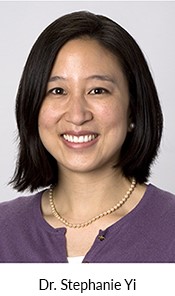
The lack of relevant quality metrics and an understanding of what to do with the resulting data coupled with small sample sizes are significant barriers to reporting surgeon-specific outcomes, according to ABMS Visiting Scholar Stephanie Yi, MD, a transplant surgery fellow at Houston Methodist Hospital in Texas.
While surgeons are familiar with the current metrics used to measure surgeon-specific outcomes, such as urinary tract infection and surgery site infection, they don’t necessarily find them to be relevant to their subspecialty-specific practice. Dr. Yi discovered this after interviewing 14 Board Certified general surgeons, as well as surgeons who specialize in critical care, abdominal transplant, and minimally invasive bariatric surgery in the Department of Surgery at Houston Methodist. These interviews were a follow-up to the implementation of a surgeon-specific reporting (SSR) program designed to assess the value of personal knowledge on individual performance quality as reported in the Journal of the American College of Surgeons.
Determining appropriate measures is a difficult task especially for surgeons who practice in a subspecialty. For example, surgeons who specialize in bariatric surgery don’t believe that general surgeon-specific outcomes are always relevant to the portion of patient care they provide. Similarly, a critical care surgeon could admit a patient into the intensive care unit (ICU) where one or more attending physicians will manage the patient’s care during his or her ICU stay. Determining appropriate measures is also difficult for surgeons who practice in a group because typically more than one partner treats the same patient. In both scenarios, the surgeons don’t know how the outcomes can be carved out to measure the portion of care that each one provides, she said.

Surgeons also want to know how they are doing compared with their peers, but point to the lack of benchmark data (often due to small patient sample sizes) and lack of guidance for interpreting the data. The surgeons also want to know how the data are being used by payers and hospitals. “While most surgeons were familiar with the measures, if a surgeon is identified as an outlier, he or she doesn’t know how to use the data to improve,” Dr. Yi said. “They don’t know what happens with the data, either.”
In addition to receiving practice-specific outcomes data, some surgeons want additional SSR data such as patient age, co-morbidities, and severity of illness. They expressed some concern that lack of a patient’s risk profile could result in an inaccurate interpretation of the data. Some surgeons would like to measure things that are difficult to capture in a metric, she said. For example, they talked about being better able to gauge how a patient is doing by visiting with the patient to see if he/she seemed comfortable, was in good spirits, and pleased with the surgery result rather than relying on a measure. “The surgeons felt that they knew after seeing the patient if they had made a difference; it’s a feeling that you can’t easily put in a quality measure,” said Dr. Yi, who is reminded of the adage that medicine is an art, not a science.
In the quest to determine more meaningful quality metrics for surgical specialists, Dr. Yi plans to contact surgical subspecialty societies for their insight. In addition, the group practice concept will have to be incorporated into the measures. “We also need to identify what the measures mean for those who don’t operate a lot, but who work in an ICU setting,” she said. With regard to developing meaningful surgeon-specific reports, Dr. Yi is in the process of evaluating how other surgical subspecialties, such as transplant and thoracic surgery, analyze their data. “We need to get a better idea of what’s important to the practices and incorporate that into quality reports for those physicians,” she said.
Next, Dr. Yi plans to determine which adult education methods can be used to improve surgeon understanding of metrics and the resulting reports, and ultimately, to aid in the adoption of such measures. She wants to go beyond just publishing the findings and use the information to propose an SSR program as an Improvement in Medical Practice (Part IV) activity to meet requirements for the American Board of Surgery’s Program for Maintenance of Certification (MOC).
“Surgeon-specific reporting has the potential to empower surgeons to improve their practice,” Dr. Yi concluded. “Our goal is to take what we learned to develop an SSR program that resonates with surgical specialists and incorporate it into MOC, connecting the dots between reporting measures and improving care.”
